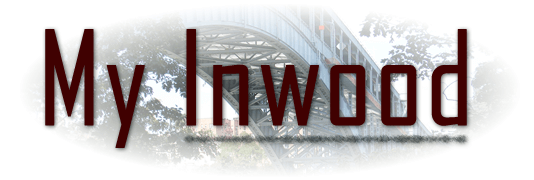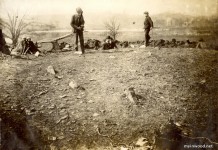In 1933 Nazi storm troopers entered the home of Max Brauer, the Socialist mayor of Altona, a working class German suburb just west of Hamburg.
Brauer and other leaders who publicly denounced Hitler had been slated for roundup.

But the handsome forty-six-year-old politician with a cleft chin and shock of dark slicked back hair had already fled.
He eventually landed in the Inwood section of northern Manhattan where he remained in exile until the conclusion of World War II.
Bloody Sunday

As early as 1931 Brauer openly opposed Hitler and his fast-growing Nazi party. He and other colleagues considered Hitler an amateur—believing the German citizenry would soon lose interest in the charismatic Nazi leader.
Brauer’s optimism was shattered on July 17, 1932. That “Bloody Sunday” some 6,000 Nazi supporters staged a march in Altona. Eighteen were killed in frenzied violence that ensued.

On perilous political footing Brauer found himself accused of corruption, a common smear tactic, but was acquitted at trial.
Brauer was a Lutheran and not subjected to the religious persecution that befell his Jewish countrymen, but his political views had targeted him for a different type of abuse. The legal proceedings had been a message—we can destroy you.
After shots were fired into his home he moved his family to the countryside. He engaged an armed guard.
Flight
On January 30, 1933 President Paul von Hindenburg appointed Adolf Hitler Reich Chancellor of Germany.
Little more than a month later, on March 5, 1933, the day of the general election, police raided Brauer’s home.
But the house was empty—the politician, using a friend’s passport, had fled to Bavaria. (He had already sent his wife and two children to Oberhof, a German resort town 260 miles south of Hamburg, hoping they would be safe until the family was reunited.)
A Glassblower’s Apprentice
Max Julius Friedrich Brauer was born in 1887 in the blue-collar district of Ottensen, along the right bank of the River Elbe. The eighth of thirteen children, his family had been desperately poor when Max was a child. His father, Wilhelm, was a glass blower. Max and his siblings lived in employee housing on the grounds of the C.E. Gätcke Glass Factory.


Brauer left school at the age of 14 to apprentice on the factory floor. Given the large number of children to feed everyone in the household was expected to contribute. A sister described Max as an inquisitive boy who devoted every spare moment to reading books.
Brauer was not destined to spend his life toiling on an assembly line. The youngster had radical ideas of fairness in the workplace and began to organize fellow workers. He spoke out for an eight-hour workday and proper housing. After leading a series of strikes he was placed on a national glass manufacturing black list.
World War I would end his unemployment. Brauer served alongside of six of his brothers on the Russian front. Brauer is known to have suffered an injury in 1915 that ended his military service.
A year after returning from combat he married Erna Pehmöller. The couple had two children, a son, Werner, and daughter, Brunhild, who everyone called Bunny. (A second son died during infancy).
Brauer entered political life in 1918 and was elected to the City Council of Altona, then part of Prussia, on the Social Democrat ticket. In 1924, after the death of the previous incumbent, Brauer was chosen as Mayor.
Under Brauer, Altona grew and prospered—surrounding villages were incorporated, public projects including housing developments and job centers were launched.
But, in 1933, a fugitive from his homeland, those past accomplishments must have felt so very far away.
A Man Without a Country
Brauer’s brother-in-law joined him in his flight from Hitler’s police. The two men, both disguised as day-trippers, first fled to Austria. After a harrowing journey Brauer reunited with his family in Switzerland in mid-April of 1933. Now on a Nazi most-wanted list, he settled briefly in Paris before being invited by the League of Nations to join other German exiles in China while his family remained behind in Geneva.
Brauer’s time in China was difficult. He felt isolated. He longed for a German revolution that would bring an end to the Nazi state. Rumors swirled in the ex-pat circles that a revolution was to be expected. It was all talk. Third hand gossip at best. But it kept them going. He drew up plans for a post-Nazi Germany.
In the fall of 1934, under diplomatic pressure from the German government, Chinese officials expelled Brauer and his fellow exiles. It was just as well. He had received a telegraph from Erna imploring him to return to Europe. She and the children were out of money and were being expelled from Switzerland for passport violations. “Meet me in Paris,” she would write.

On September 29, 1934, Brauer departed China through Shanghai. On a manifest for the S.S. President Pierce, a twin-screw passenger liner, Brauer listed his occupation as “diplomat.” A year into what he would later wryly refer to as his “world tour” Brauer stopped over in the United States on his way to France to discuss job opportunities with another exile, Leopold Lichtwitz, in New York.
Brauer spent two months in New York exploring job possibilities before boarding the Red Star passenger ship Pennland bound for London. Typed neatly on the manifest for the trans-Atlantic passage were several details: “In transit to France”— Occupation: “Officer of the League of Nations”—Citizen of: “Germany.”
The Pennland arrived in London on December 10, presumably in time for the Brauer family to spend Christmas together in Paris.
Arrested
The following year, 1935, proved utterly demoralizing.
Job inquiries in Paris, Belgium, the U.K. and Sweden went nowhere. On Christmas Day his worst fear was realized. French police, acting on a request from German authorities, arrested Brauer in his home. Brauer spent a week behind bars before his lawyer, Jean Longeut, an expert on political asylum and a grandson of Karl Marx, secured his temporary release pending extradition to Germany.
During his window of freedom Brauer secured an invitation from the American Jewish Congress to become part of a U.S. lecture tour. On September 11, 1936, Brauer, now a seasoned traveller, boarded the S.S. Lafayette at Le Havre, a large port city on the northwest coast of France, for another trans-Atlantic crossing. The Lafayette’s manifest listed the forty-nine-year-old Brauer’s occupation as “lecturer.” Under nationality was written a single word: “WITHOUT.”
Nazi Public Enemy #1

Brauer’s talks, up and down the east coast, were heavily covered by the press, which nicknamed him “Nazi Public Enemy #1.”
“I was listening to the radio one night and I heard a speaker say than an order had been issued for my arrest,” he told a Syracuse, NY Kiwanis group in October of 1936. “So I escaped before they came to get me and fled to Switzerland. Since then I worked on behalf of the co-operative movement there and in China and also as an advisor to the league of Nations. I am now lecturing throughout the United States.” (Syracuse Journal, October 6, 1936)
Speaking perfect English Brauer warned audiences of the “megalomania” that infected the Nazi party.
“All religious discussions in the press and public are forbidden in Germany,” he told members of a Presbyterian church in Buffalo. “Reports to the foreign press as well as private letters sent abroad touching upon the conflict are considered high treason. The facts are concealed: the truth is suppressed. Only repetition of the Nazi ideology, the totalitarian state, the community of the nation and the racial principle is permitted. The totalitarian state and all that goes with it simply means despotism treated as a principle.” (Buffalo Express, January 18, 1937)

In Methodist conference dinners, Presbyterian churches and university auditoriums Brauer repeated his mantra.
Brauer explained that anti-Semitism was a cornerstone of the Nazi ideology and that Jews in Germany and elsewhere must be supported internationally.
German spies were rumored to have attended his talks.
Reunited
Brauer returned to Paris in 1937 to pick up his nineteen-year-old son. He and Werner returned to New York aboard the French passenger ship S.S. Paris that departed Le Havre on September 18th.
His wife and daughter followed a year later. Brunheld, an athletic young woman who once dreamed of becoming an opera singer, had been seventeen when her family fled Altona. She was twenty-two when her ship arrived in Ellis Island. Onboard she met her future husband, Horace Liebler, another refugee in flight from Nazi persecution.
The Brauers settled in the Inwood section of Manhattan, a mainly residential neighborhood on the very northern edge of Manhattan.
Exile in Inwood

A 1940 census taker found the family living in a rented apartment located in 687 West 204th Street. The now fifty-one-year-old Brauer reported that he worked in the advertising industry.
The Brauers, while nearly four thousand miles from home, had landed in a neighborhood full of German immigrants. Inside their six-story art deco building the family enjoyed the familiar smells of German home cooking—perhaps the sausage, carrots and potatoes in a neighbor’s Steckrübeneintopf simmering on the stovetop.
The heads of seven other families in the Brauer’s handsome brick building, Michels, Moeckel, Brandt, Rapp, Lilienfeld, Hickenberg and Edinger, all listed Germany as their place of birth. (1940 Federal Census) Russians, Swedes, Polish, Hungarians, French, Chinese, Irish and native New Yorkers rounded out the multi-ethnic mix.
When not dining at home, the Brauer’s might have treated themselves to ice cream at Shillingman’s on Dyckman Street, sugary confections from Broger & Luessen on 207th Street, pastries from Nasch’s Bakery or sandwiches from Schwartz’s Deli.

The family later moved ten blocks north to another rental apartment inside 10 Park Terrace East near Inwood Hill Park, a picturesque 196-acre green space that borders the Hudson River.
By 1940 some 20,000 German natives, many of them Jewish, had settled in northern Manhattan. Brauer would revel in the company of other Germans, but every conversation eventually circled back to the war. He launched a newspaper, The New People’s Daily, and raised funds that allowed hundreds of refugees to secure ship passage to American shores.


In 1943 Brauer and his wife became United States citizens. Though proud of his adopted country, Brauer would consider the move a temporary measure. He longed for Germany and hoped one day to return.

To firm up his allegiance he registered for the draft, joined the Rotary Club and continued his lecture tour.
When the war ended he knew he must return to Germany to help rebuild his shattered homeland.
Return to Hamburg
In July of 1946 Brauer returned to Hamburg on a mission funded by the American Federation of Labor. Friends persuaded him to run for Mayor— a move that required he give up his U.S. citizenship.
On October 25, 1946 Brauer renounced his American citizenship and signed the document that made him, once again, a German subject. (Earlier, a clerk had inked over the swastika on his citizenship paper as the interim government was still using forms generated by the Third Reich.)
“You can’t change nationality like a shirt,” Brauer would tell an American reporter. “I was lucky in America and I was proud of my adopted country. But I believe the front-line battle for democracy is right here in Germany. When the Social Democrats asked me to stand for election here in Germany, I felt called upon to give my lifelong experience to the city where I was born. I was sorry to foreswear my allegiance and give up my good life in New York, but it is right here that my duty lies.” (New York Sun, Dateline: Nov. 27, 1946)

Bürgermeister
On November 22, 1946, after a decade in exile on U.S. soil, Brauer was sworn in as Hamburg’s first post-war Mayor—a post he would hold until 1953. (He served again from 1957-1960)

Days later, surrounded by the rubble and despair of post-war Germany, Brauer would comment, “It is tough for me to accustom myself to German rations. The 1,500 calories I get here daily are about what the average New Yorker has for breakfast. My wife, now living at 10 Park Terrace East, Manhattan, will have a shock when she joins me.” (New York Sun, Dateline: Nov. 27, 1946)

Brauer was eighty-five when he died in 1973.









This was so interesting since I grew up in Inwood in the 40s and 50s. One of my closest friends at 10-20 Post Avenue was born in the U.S. but her parents had fled Nazi oppression as well. I was too young to learn much about them but Helen Kleffman, daughter of Albert (or Alfred) Kleffman, was eventually one of my bridesmaids.She had a younger sister named Judith. Her father was Cantor of the Jewish synagogue then located on Vermilyea Avenue. I wish I had known more about them. Another friend, Leah Muller, came to the U.S. from Germany via Israel, but I don’t recall her parents’ names. Another Jewish friend at 10 Post was Barbara Lazarus, but again I can’t remember her parents’ names. Of course this is just information I recall and may not be totally accurate since I was so young. I wonder if Mr. Kleffman knew Max Brauer during his time here. I know the Jewish community was a closely knit one. I really enjoy your historic articles about Inwood.
Hi Cole: This was so interesting…where do you find this stuff? What an admirable person he was to go back after the war. I would have stayed in “10.” Any information about when he passed?
Betty
My GG-Grandfather was Rudolph Brauer. He was born in 1858 in Ottensen, Germany, was a glassblower like Max, and was Max’s Uncle. Rudolph was one of Kaiser Wilhelm’s many valets and left Germany with his wife, Johanna in 1889 to come to the US. He settled in Newark, Ohio and worked as a glassblower there. Max came to the US and looked up his Uncle Rudy who had moved to Kokomo, Indiana to see about finding a job here. Rudy was not able to help him but Max shortly thereafter got a job as an adviser with the US Government. Max was my Great Grandmother, Martha’s first cousin and they wrote to each other for years after he became Mayor of Hamburg.
Dennis,
Thanks for writing in. Its always great to hear from a family member. What a fascinating life Max led.
Great article, Max was my great grandfather. His daughter Brunhild and her husband Horace were my grandparents whom I lived with growing up. I always heard stories of their flight, but this story has some wonderful details I had not heard before.
Dennis Zlatkin, any more info you would like to share would be great. Sounds as though we are distantly related.
Christopher, the prospect of gathering more information about Max and his family sounds wonderful. I have been trying to find a family tree for the Brauers in Germany for quite some time. Perhaps you can help me fill in the gaps and I will be happy to provide you with any information I have.
Christopher, I would very much like to share any of my Brauer Family history that you would be interested in. I have been trying for years to find information on Max’s Family tree but have not been successful beside finding what information I can find on this website and Wikipedia. Perhaps you can help me fill in the blanks.
Christopher, you may contact me via e-mail to exchange more Brauer genealogy. I have newspaper articles from the 1930’s and 40’s when Max was lecturing at Universities in Central Ohio. He would always stop in and visit his cousin Rose Dildine (Brauer), my Great Aunt who lived in Newark.
Christopher, my e-mail address is dzbarknspark@gmail.com if you would like to exchange family information. I would really like to see how my Grandfather, Rudy, fits into the family tree. I assume he was a brother to Max’s father, Wilhelm.